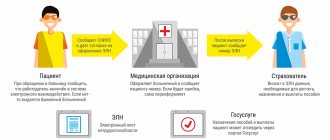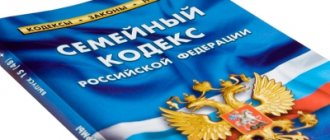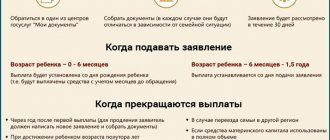Low-income family status in 2021
It is worth moving on to solving the problem of how to obtain the status of a low-income family only after receiving information about which family in Russia is considered low-income.
So, what family can count on government subsidies?
A low-income Russian family consists of persons related by blood. Moreover, the total family income for the last 3 months for each person must be less than the minimum subsistence level established by the state.
It is important to consider who is considered low-income, for example, in Moscow, may not qualify for income in Vladivostok or Rostov. This is due to the fact that each region sets its own cost of living.
The minimum determined by local authorities is calculated based on the basic needs for the month:
- food basket;
- goods classified as necessary.
Who ultimately counts as poor? First of all, the following families in the regions can apply for benefits:
- incomplete;
- large families;
- low-income families;
- including pensioners and disabled people.
Moreover, the status of a low-income person gives the right to receive benefits and benefits:
- payment for housing and communal services;
- lump sum payment;
- free travel on public transport;
- mortgage lending at reduced rates and more.
The full list of preferences depends on the region of residence.
It is not enough to know what the term “poor citizens” represents. It is important to understand who belongs to them. More precisely, who should you include in the family when you collect documents and certificates for a low-income family? A low-income or needy family is a community of persons:
- living in the same territory;
- running a general household;
- united by ties of kinship of a different nature.
In simpler terms, recognition of a low-income family occurs when documents are provided for all people living together.
Officially, a family can be either a couple with children or an aunt with nephews. The law on these issues is clear but flexible.
The questions of whether a family is low-income or not, what documents and statements are needed to register a low-income family, how to obtain low-income status in the regions and Moscow are regulated by Federal Law No. 44 of 04/05/2003.
Who belongs to the category of low-income families in 2021
We do not receive any payments for our daughter; she was born 5 years ago. I recently found out about the payment of benefits to low-income families and a social protection employee pointed out that in order to apply for assistance, I need to collect data on the income of the family members with whom my daughter lives/is registered - my mother, father and brother.
What documents are needed to obtain status
Considering that there are 4 citizens registered at the family’s residence address, the total amount is divided by 4, after which we receive an amount of 8012.50 rubles per family member, which is less than the amount established by the subsistence level in the Russian Federation by 2688.50 rubles. This difference was calculated at the Federal level.
- exemption from taxes on all types of payments made under the state program.
- provision of free legal services;
- health care benefits;
- non-competitive admission to a state university for a person under 20 years of age who has successfully passed the Unified State Exam and is dependent on a group I disabled parent.
- free travel on public transport for children under 7 years old;
- benefits for purchasing train tickets;
- provision of priority places in kindergartens and nurseries;
- discounted meals for schoolchildren;
- provision of free medicines to children under 6 years of age;
- benefits for travel to another country for the purpose of treatment;
- compensation for the purchase of compulsory school uniforms and stationery;
- obtaining a ticket to a sanatorium.
You might be interested ==> Status of labor veteran Krasnodar region
How to obtain low-income family status
If acts of fraud are detected or sources of income are concealed, the status of the poor will not be assigned. If the fraud is discovered later, the family may be required to return all payments obtained illegally.
- "Governor's" payments , which are monthly and quarterly benefits until the child for whom they are paid reaches the age of sixteen. The amount of this benefit is set at the level of a particular region and is not subject to federal regulation.
- One-time payment at the birth of a child . It is paid regardless of which child is born in the family. Its size is established in each region based on the subsistence level established for children in the region of residence of a low-income family.
- Monthly payment for the third and subsequent children . This type of payment is provided only for low-income and large families that have confirmed their status from a legal point of view. The payment is equal to the cost of living per child established for the previous quarter in the region. If the subsistence level has been indexed, the child benefit is also indexed so that it does not fall below the established subsistence level. The payment is made until the child reaches the age of sixteen, and if the child is a full-time student at a university, it is extended to twenty-three years.
- Child care benefit until such a child reaches the age of one and a half years . The amount of such benefits is established in the form of forty percent of the parent’s average earnings for two years or based on the established amount for such benefits at the level of regional legislation. Depending on the number of children, the benefit amount will vary. It is subject to annual indexation.
Today, a low-income family should be understood only as those families whose standard of living is considered insufficient due to the fact that the average per capita income for each family member is lower than the minimum subsistence level established in the region for a specific category of the population or the average level of subsistence level in the region . Such families can count on various benefits from the state to improve their living conditions.
What can you expect?
Most often, the status of low-income families is assigned to large families that have not yet taken part in government programs for improving existing housing conditions or are on the waiting list for such implementation.
Social benefits are regular cash payments. Most likely, when talking about how to raise the family budget, you mean benefits. I will give a few examples so that you can imagine the amounts we are talking about.
For example, there was such a case in judicial practice. The woman was assigned a state social benefit. She indicated only one place of employment in her income information. The social protection authority learned that she additionally works as a social worker in a government agency. This means that she provided false information about her income. The social security agency demanded the overpayment back. I had to return 255,227 rubles. The court agreed with this.
How is family income calculated?
Social assistance for the poor is support for those who find it difficult to earn a living. Among them, the state must choose those who have it harder than others and help them. These are the disabled, the seriously ill, the unemployed, single-parent and large families. The state provides them with a living wage. Everyone else provides it for themselves.
The legislation also provides for other types of assistance to low-income citizens. Thus, the benefits that are paid to them are not taxed. In addition, within the framework of state support programs, legal assistance is provided to people in need free of charge.
If the parent is employed, then all lump sum payments are provided to her through the employer. Members of low-income families need to submit applications and documents only to the territorial social protection department or MFC. Employment does not matter in this case. To assign payments to specialists of the MFC or social security authority, the following are provided:
Benefits for children under three years of age
This list is not exhaustive. In each specific case, specialists from the authorized body may require additional documents. For example, other documents are required if one of the persons registered in the residential premises left for a while (in connection with military service, to serve a criminal sentence, etc.).
- Families consisting of two adults and children, that is, complete. Assistance is provided to them if they have a low overall income, and also if they have a disabled child.
- Single-parent families with children.
- Relatives of military personnel who were called up by summons.
- Families with 3 or more children.
Package of documents for assignment of low-income family status
How to register a low-income family in Russian cities and Moscow? Of course, you will initially need to collect documents to present to government agencies. In order to obtain low-income status, you need:
- passports of all adults;
- children's birth certificates;
- certificate of composition of a low-income family;
- work books or certified copies;
- income certificate.
In fact, this is the basic package of how to officially recognize yourself as low-income. But, for different types of preferences, additional documents may be required to assign payments and benefits.
Moreover, low-income citizens applying for cash benefits must supplement the above list of papers:
- an extract from the Employment Center;
- statement;
- bank account details.
In addition, upon request, the family must present to special authorities for processing payments the following certificates:
- from the place of study;
- about pregnancy;
- about the service.
Moreover, in each specific case, specialized documents are requested.
But confirmation of low-income family status is not available to those who do not work without a good reason. If any of the persons indicated in the application has no income. At the same time, if you are not registered with the Labor Exchange, you can forget about obtaining the official status of a low-income family.
Procedure for assigning status
Recognition as low-income people in the regions and Moscow follows an identical algorithm. So, how to apply for government support? Obviously, the family must act within the law, as follows:
- collect the necessary documentation;
- submit an application to government agencies;
- wait for the response from the responsible employees (the decision is made within 5 days);
- obtain a document confirming your low-income status.
Low-income people in Russian cities and Moscow, among others, are included in a single database. Therefore, if you have received the status of a low-income family, and the supporting certificate has been lost, you can order a new one at any time.
Grounds for refusal
If the status of a low-income family is not confirmed, then the applicant has the right to learn about the reasons for the refusal. Most often they become:
- incorrectly completed application;
- incomplete package of documents.
In this case, of course, low-income status can be obtained. How to get it? All you need to do is:
- correct errors and inaccuracies;
- resubmit the set of papers.
Those who have not passed the income test should not think about how to obtain the status of a low-income family in the near future. In addition, those applicants whose relatives do not have income and fall under the definition of a parasite will also be refused.
Regional features of obtaining the status of a low-income family
Are there any specifics regarding how to register the status of a low-income family in the regions and Moscow? Yes, each subject of the Federation has the right to independently:
- add requirements for applicants;
- change the registration procedure for low-income families;
- establish a living wage for low-income people.
So, how to become a low-income family in different cities of the country and in Moscow? First of all, potential low-income families need to consider the following factors.
Living wage for the poor
As you know, the cost of living for all categories of citizens, including representatives of low-income families, has increased in 2021. In fact, the increase affected all constituent entities of the Russian Federation.
For people for whom the status of “poor” is urgently needed in Moscow, in order to understand how to obtain it, you need to rely on the following amount of income (in rubles):
- common for citizens - 17 329;
- able-bodied – 19 797;
- retired - 12 253;
- minors – 14,889 rubles.
For comparison, you can study the figures for some regions of the country.
| Region | Living wage (in rubles) | |||
| General | Able-bodied | Retired | Minors | |
| Tverskaya | 10 843,14 | 11 706,07 | 9031,16 | 11 266,60 |
| Murmansk | 16 476 | 17 134 | 13 693 | 16 542 |
| Tyumen | 10 949 | 11 528 | 11 168 | 8808 |
| Irkutsk | 11 229 | 11 940 | 9102 | 11 647 |
| Omsk | 9682 | 10 257 | 7833 | 9875 |
In Moscow, the cost of living is the same for all parts of the capital. But the poor in some areas have to additionally find out the minimum for themselves, based on their region of residence. That is, in the region there is an additional division by amounts. Such a system operates, for example, in the Irkutsk region and Krasnodar region.
Required income level
How to obtain the status of a low-income family in the regions and Moscow? In order not to waste time, it is worth calculating your level of income for the last quarter. A family will be recognized as needy if, when summing up all income, the final income is less than the subsistence minimum.
This rule is relevant for all subjects of the Russian Federation.
What types of income are taken into account?
Thus, when applying for low-income family status in Moscow or any other city, it is worth carefully studying how to get the correct total income. Since not all types of financial income are taken into account in the calculations.
What income must be included in the list? The list is given below:
- wage;
- alimony;
- state benefits;
- dividends;
- bonuses and other types of payments related to the performance of professional duties;
- copyright proceeds;
- earnings on a personal plot (selling vegetables, fruits, etc.);
- payments from tenants and more.
If any of the persons indicated in the application makes contributions in the form of alimony, then this amount will be deducted from the total income. But the payment is recognized only if evidence of payments is provided in the package of documents.
In addition, when determining who is considered low-income based on total income, government agencies subtract from total financial receipts:
- federal and regional social assistance;
- insurance payments.
The latter can be produced:
- as compensation for damage;
- for rehabilitation.
Those who are thinking about how to obtain the official status of a low-income family in Moscow should take into account that each candidate is also checked for property suitability. This includes identifying whether any of the declared persons are the owners of:
- real estate;
- vehicle;
- cash deposits.
Each item has its own acceptable and unacceptable parameters. For example, those who, according to the standard algorithm, are recognized as low-income in Moscow may have:
- living space no more than 18 square meters for each family man;
- non-residential buildings;
- dacha
Applicants who own:
- several apartments or houses;
- 2-3 cars;
- land for construction;
- deposits of more than 1,000,000 rubles.
A potential low-income family living in Moscow should not hide information about their income.
Checks are carried out carefully and if fraud is detected, the poor group will be required to return all funds received. Moreover, they will be denied the opportunity to obtain the status of a low-income family for the next 5 years.
Nuances of receiving in the regions
When considering how to obtain the status of a low-income family, you need to take into account regional characteristics. To avoid mistakes, the applicant is recommended to contact the government agency at the place of residence and find out all the nuances of submitting the necessary documents.
In 90% of cases they affect:
- review time – from 5 to 30 days;
- the list of benefits is as expanded as possible in the capital;
- conditions and methods of filing papers.
For example, low-income people in Moscow and the region have mastered the electronic registration method. For this purpose, a special mechanism has been developed that allows you to do everything without visiting any institutions.
In regions, such algorithms are used less frequently. Moreover, some regions do not offer an electronic version at all.
Material on the topic: How to formalize a refusal of inheritance in 2021 (+ sample)
Which family is considered low-income?
You can apply for benefits at social security or at the MFC. The list of documents submitted for benefits can be clarified in advance with these organizations. You can also submit documents for benefits through the State Services and My Documents websites, and Muscovites can use the website of the Mayor of Moscow.
Termination of benefit payments to low-income families
Sometimes this is a specially allocated amount that is paid directly before the start of the school year. In some regions, local authorities, on the contrary, reimburse parents for their expenses on purchasing necessary items after presenting receipts.
The state thinks about us. Photo: zen. yandex.ru
- One-time payments. The family applied to social support, they were recognized as low-income and given a fixed payment. However, who to give and who not to give is decided by the social welfare authorities. In some regions, for example, St. Petersburg, to receive this type of assistance you will need to report on the level of expenses. If they exceed 25% of income, then there will be one-time payments. Also, lump sum payments are given to families in difficult life situations. For example, after a fire, theft or during unemployment. Families with children can also apply for a one-time payment. Most often they are timed to coincide with some event. For example, a payment is made in connection with birth or entry into first grade.
- Natural assistance: firewood, timber for building a house, food, clothing, medicine. For example, in Komi there is an additional payment for food for pregnant women. In other regions, assistance is provided with products from the dairy kitchen: porridge, juice, and also vitamins.
- Free services . For example, legal assistance, spa treatment.
- Tax benefits. Low-income people do not pay personal income tax on the assistance they receive. In the regions there are benefits for paying property taxes.
- Privileges. For example, in some regions, schoolchildren from low-income families are given free travel and meals at school. Also, such families can receive a discount on housing and communal services and kindergarten.
- A social scholarship is also a regional benefit established by local authorities.
- Providing housing. A low-income family has the right to receive free housing under a social rental agreement. But it's not easy. Firstly, you must reside in the region for at least the period established by local authorities. Secondly, annually confirm the status of a low-income family. Third, wait patiently for your turn.
- A social contract is a special type of social assistance. An agreement is concluded between the family and the state. The state gives money, and the family fulfills certain obligations. For example, one of its members gets an education, gets a job and thus increases their income.
You might be interested ==> Allowance for 3 children in 2021 in the Kemerovo region
For example, a husband, wife and their two minor children live in the same apartment. They also have a very old and almost incapacitated mother of her husband, who lives in the next apartment. They live on the same landing and constantly look after the old woman, but for the social welfare authorities they are different families, since they live separately.
The poor - who are they?
The subsistence minimum is the minimum amount on which, according to local authorities, an average person can live. A complete list of living wages by region is available here. That is, this includes payments for housing and communal services, food, clothing, and personal hygiene products. Each region has its own cost of living, since prices differ.
There is no single law that would regulate the level of material support from the state. In each specific case, people receive targeted assistance. Its value is established by local authorities.
When calculating the amount of total profit, the entire family income is taken into account. A family consists of spouses “plus” minor children. They are all required to live in the same apartment or house. Grandparents and other relatives are considered a family if they all live together and are registered at the same address. If children are adults and live separately from their parents, then their earnings are not taken into account. They are no longer family members. Divorced parents who have a common child and are registered at the same address are required to add up their income if they want to receive low-income status.
Who is considered low-income in Russia?
According to Federal Law No. 44, the calculations take into account earnings for the last three months and divide by “3”. Income is taken without deduction of mandatory taxes and fees. This takes into account the number of all family members.
In fact, this is also not difficult to figure out. The calculation procedure is specified in Article 14 of Federal Law No. 44 “On the procedure for recording income and calculating the average per capita income of a family and the income of a citizen living alone for recognizing them as low-income and providing them with state social assistance.”
Calculation of status in 2020
How to correctly calculate whether a family is low-income or not? Representatives of government agencies use a simple algorithm:
- sum up all income;
- divide the resulting amount by three;
- divided again by the number of people indicated in the application.
Thus, the final number will be the income of applicants for low-income family status. It is compared to PM in the region. If the income is less, then applicants have the opportunity to receive subsidies from the state. Otherwise, they will definitely be refused.
At the same time, it must be taken into account that each category of citizens has its own minimum. This means that comparison will be made with different indicators.
How to calculate income yourself? It's pretty simple. Let’s assume that the father of a family consisting of 5 people applied for recognition as needy:
- father – officially employed;
- mother – stays at home as she looks after children aged 2 and 17 (the eldest child is in school);
- grandmother - receives a pension.
They live in the capital. The statement was written in June 2021. Therefore, the following months are taken for calculations:
- March;
- April;
- May.
For 3 months, the listed persons received the following income:
- father – 90,000 salary;
- mother - 30,000 payment from maternity capital for the second child;
- grandmother - 45,000 pension.
Now you can carry out calculations using the standard formula (90,000+30,000+45,000)/3/5 = 24,300. Since the standard PM in the capital is 17,329 rubles, applicants cannot be considered needy.
You need to understand that each case is individual. Payment from MK is not considered social assistance, therefore it is taken into account in the calculations. Other child benefits may fall under a different category and be deducted from the total amount.
Who is included in the family
- The employer is obliged to issue the employee applying for status a certificate, which includes the amounts without deduction of taxes. This can be a certificate in form 2-NDFL or a certificate in free form, but must be signed by the head and chief accountant of the organization.
- Information about all property owned by family members must be submitted. Namely:
- Real estate (land plots, houses, apartments, cottages, garages);
- Transport and other mechanical means;
- Means for storing and processing products.
- Divorced parents raising children are required to show receipt (absence) of alimony.
- In schools, children are sometimes provided with discounted breakfasts or other benefits (even small ones). This is also included in income. A certificate from an educational institution is required. The same should be done if the child attends a preschool institution, an educational institution of secondary or higher vocational education.
- Family income also includes the amount of income from the rental of real estate and other property, income received from the sale of fruits and products of personal subsidiary plots.
All information is verified by sending an interdepartmental request. Failure to provide information leads to refusal to assign status.
Nuances of income information
- The amounts received by all family members over the last three months to the date of application are taken.
- Income includes:
- All monetary payments provided for by the remuneration system;
- Average earnings maintained in cases provided for by law;
- Compensations paid for the performance of state and public duties from such bodies;
- Severance pay;
- Social payments from budgets of all levels (pensions, scholarships, benefits provided by kindergartens, unemployment benefits, lifelong maintenance of judges, benefits, compensation, insurance payments, allowances and surcharges);
- Income from property owned by the family;
- Other income (monetary allowances for military personnel, employees of internal affairs bodies and similar bodies, one-time benefits upon dismissal from service, payment for work under contracts, financial assistance, royalties, income from business activities, income from shares, alimony, income from bank deposits, inheritance and present).
May 01, 2021 semeiadvo 506
Share this post
- Related Posts
- Social measures to support diabetics in 2021 in Moscow, do they provide money for receiving food?
- Benefit up to 3 years in 2021 Kemerovo
- How many test strips will be provided to patients with type 2 diabetes in St. Petersburg in 2021?
- List of the Ministry of Health of preferential medications for people with disabilities of group 3 vision in 2021
What payments are due to the poor?
Low-income families are entitled to a long list of benefits and benefits. Some of them are of a material nature, others represent new opportunities for the applicant and his relatives.
One-time benefit
A lump sum payment is made once and has several types:
- for pregnancy (prescribed if a woman is registered at the clinic for up to 12 weeks);
- upon the birth of a child;
- for an adopted child (appointed 6 months after the end of the adoption procedure);
- for school fees;
- women expecting a child whose spouses serve in the Armed Forces of the Russian Federation;
- financial payment.
The latter type of assistance varies by region. Each subject sets its own size and rules for receiving it.
The listed government payments can be issued in 2 ways:
- simultaneously with receiving the status of a person in need;
- after him.
In the first case, the following grounds for payments are added to the package of documents specified in one of the sections:
- pregnancy certificate;
- an extract stating that the husband is a military serviceman;
- certificate from school.
In the second case you will need:
- low-income certificate;
- listed documents;
- passports;
- children's birth certificates.
State support is not targeted. The money is transferred to the applicant's account and can be used at his discretion.
Utility benefits
Subsidies for housing and communal services are provided in the form of a refund of part of the payment paid, which is higher than the regional norm. The calculation process takes into account:
- applicants' income;
- square footage of the room;
- percentage of payments relative to income.
Compensation is transferred to the payer’s account after 100% payment for housing and communal services .
The following documentation is required for its appointment:
- passports of all residents;
- title documents for the apartment;
- proof of income;
- paid receipts for utilities;
- current account number.
The subsidy is issued for 6 months . The right to it must be confirmed after six months.
Housing benefits
If those recognized as needy do not have their own housing, then the state provides them with an apartment, a dorm room or a house on social rental terms. There is a minimum charge for accommodation. In some regions, authorities completely exempt residents from paying it.
But getting public housing is extremely difficult. For this you will need:
- stand in line at your place of registration;
- confirm your status every 2-3 years.
The package of documents differs in each region. But in any case, the following documents will be requested:
- passports;
- saints about the birth of children;
- confirmation of the lack of own housing;
- income certificates.
In fact, the queue for housing is moving very slowly. As a result, in a number of constituent entities of the Russian Federation no more than 2-3 apartments are provided per year.
Child benefits and allowances
In each region, local preferences are added to federal preferences. But in any case, the child is entitled to:
- free hot meals at school;
- reimbursement of costs for the purchase of school uniforms and items necessary for education;
- travel by public transport;
- free train travel;
- dairy kitchen (for newborns).
Tax benefits
Those officially recognized as needy are exempt from paying state registration fees:
- real estate rights;
- contracts for the alienation of real estate.
In addition, they are exempt from taxes on:
- pensions;
- social payments;
- subsidies.
In addition, in the regions of the country additional benefits are provided for the following types of taxes:
- transport;
- land.
There is no need to apply for benefits separately. Simply, at the time of registration of rights, the applicant provides a certificate confirming his status or statements of financial receipts.
Who can get help?
It represents the implementation of all actions that can make life easier for low-income families, disabled people or single citizens. Such assistance to low-income families is provided on the basis of need. That is, social workers must inspect their area and find out who needs to be monitored. However, the main problem of modern legislation is its vulnerability. The fact is that this rule can be taken advantage of by unscrupulous people who can bypass it in order to get extra money. Naturally, in this case the legislation must be flexible. It is imperative to define some criteria for providing assistance.
You might be interested ==> Social payments in the Tver region to single mothers
Federal or regional assistance?
Naturally, all people want to live in such a way that they can afford everything they want. However, in our country, as in many other countries, there are still citizens for whom such a life is a dream. A low-income family is a family that has a very limited amount of money. They are barely enough to meet the needs of adults and children. Therefore, the state is obliged to help them.
- Insufficient square footage of available housing per resident.
- Inconsistency of living space with current safety or sanitation standards, as well as lack of amenities. The latter usually includes corridor-type housing where there is no water, sewerage, gas or electricity.
- Living with sick people in non-isolated premises (the person must not be a relative of the applicant).
- Long-term residence in a hostel (with the exception of being in training or seasonal work) or in rented accommodation (the last couple of years).
Where to register and confirm the status of a low-income family
The simplest and fastest options:
- remote;
- through social security authorities.
Each method has its own characteristics.
State Services website (step-by-step actions)
In order to apply for state support, the applicant must:
- have an account on the portal;
- confirm it.
The latter is done in one of three ways:
- entering a password sent via email;
- via digital signature;
- using the Sberbank-online service.
Next you need:
- log in to your profile;
- select the “Electronic service” section;
- click on the desired type of service;
- go to “Completing an application”;
- Fill out and click on the “Submit” tab.
For some types of state For help, you will need scans of documents. They are attached to the application.
Review takes on average 10 days. You can track the current status of your application in the “My Applications” section.
Social protection authorities
For most, contacting social security authorities is a more common method. But first, you should visit the nearest institution and find out the requirements and rules established in a particular region. The further algorithm of actions is simple:
- collection of documents;
- making an appointment;
- visit at the appointed time;
- submitting papers and filling out an application;
- The reply is in process.
The decision is made from 5 to 30 days.
Those in need and anyone related to them can ask questions of interest by calling the toll-free hotline number – 8-800-555-0-222.









